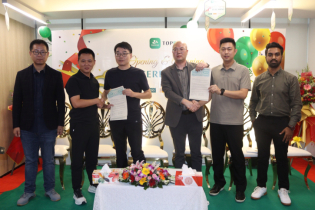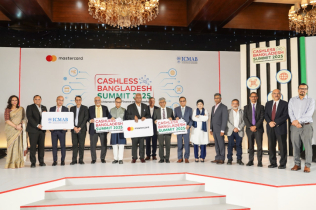Nobel Economics Prize 2025 goes to trio for explaining how technology powers long-run growth

Published : 00:34, 14 October 2025
Joel Mokyr, Philippe Aghion, and Peter Howitt have won the 2025 Nobel Memorial Prize in Economic Sciences for landmark research that explains how innovation drives sustained economic growth through a process often described as “creative destruction.”
The Royal Swedish Academy of Sciences said the trio’s work has transformed understanding of why some economies keep advancing while others stall, by showing how new technologies and ideas replace older ones, lifting productivity and living standards over time.
Mokyr, an economic historian at Northwestern University, was recognized “for having identified the prerequisites for sustained growth through technological progress,” drawing on centuries of evidence to show how scientific knowledge, skilled artisanship, and pro-innovation institutions seed breakthrough technologies.
Aghion (Collège de France; also affiliated with INSEAD and LSE) and Howitt (Brown University) were honored jointly “for the theory of sustained growth through creative destruction,” a formal framework that captures how competition, R&D, and firm entry spur waves of innovation that upend incumbents yet raise welfare in the long run.
The prize totals 11 million Swedish kronor (about $1.0–1.8 million depending on conversion used by outlets), with half awarded to Mokyr and the other half shared by Aghion and Howitt.
Beyond clarifying the mechanics of growth, the laureates’ research carries concrete policy implications: economies that protect competition, invest in basic science and human capital, and avoid entrenching monopolies tend to innovate faster; conversely, protectionism and weak antitrust can suppress the churn that fuels progress.
The committee noted the relevance of these insights today as governments grapple with AI, biotech, and clean-tech transitions, fields where the right mix of research funding, openness, and competition policy can determine whether innovation accelerates or stalls.
Their ideas are visible in everyday life: streaming platforms superseding DVDs, smartphones displacing earlier devices, and e-commerce reshaping retail.
While such shifts can be disruptive for incumbent firms and workers, the laureates’ work demonstrates how, with supportive policy, the resulting productivity gains translate into higher incomes and improved living standards across society.
Sources: Reuters; The Guardian; Associated Press; Nobel Prize official press release & announcement (Royal Swedish Academy of Sciences); ABC News; American Economic Association; Wall Street Journal.
BD/AN











